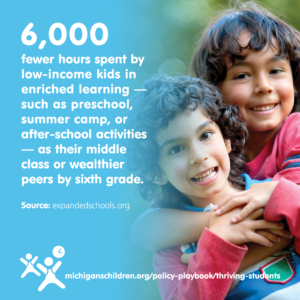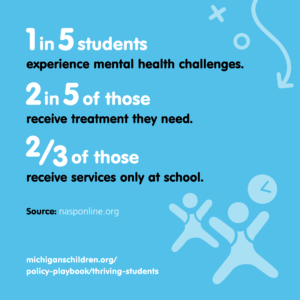Michigan’s children will be our next scientists, entrepreneurs, teachers, parents, laborers, artists and lawmakers, and our future depends on preparing them for education, work, and life. There is universal agreement that a high-quality K-12 education matters for our future, but our results are not meeting the outcomes we need. By the time poor children are in the 6th grade, they have spent 6,000 fewer hours learning, resulting in gaps in their academic success. By the third grade, white students are well above their peers of color in reading, by the eighth grade those gaps are even larger for math outcomes. High school dropout rates remain higher for Black, Hispanic and American Indian students, and for those facing life challenges like poverty, disability and homelessness.

Years of research and the lived experience of youth and families have taught us that in order to succeed, students need: parents and caregivers who have tools to support their children’s learning at home; trained school professionals who can recognize and respond to students needs; access to basic resources that are essential to learning; and academic tools and pathways that enable their educational success.
Students who begin behind in school remain behind without appropriate
intervention, and other students face life challenges that require additional academic supports, particularly those experiencing foster care, homelessness or juvenile justice.
- Continue to redesign K-12 funding to reflect individual student needs, and increase expectations to ensure that funds are being utilized, through in-school or community-based strategies, to address service needs for student populations who have the lowest graduation rates, including students experiencing foster care, homelessness, juvenile justice, and disability.
- Prioritize policy and investment decisions that will help keep students and their families in school and engaged with classroom learning.
- Provide dedicated state funding to ensure quality after-school programs are available statewide so every student has access to out-of-school opportunities that support their behavior, skills, and school engagement.
- Remove barriers to families affording child care for their school-age children by ensuring that quality after-school and summer learning programs can qualify for child care funds.

- Preserve and expand state support for competency-based education and flexible paths to graduation which provide flexible scheduling, smaller classes, alternative credit bearing options, and post-secondary pathways to students who may struggle to achieve and graduate due to their personal circumstances.
- Build programs that address the specific needs of children, youth and caregivers experiencing foster care, including communications, trauma-informed practice, improved assessment and service provision for developmental and learning delays, and additional flexibility.
Children learn best when their households are able to reinforce lessons from school and effectively interact with schools and other services. Building caregiver skills and improving access to services for families leads to resilient and successful students.
- Preserve and expand state support for adult education programs that provide opportunities for young adults and parents to build literacy skills, earn a GED, and prepare for a career, improving workforce participation and family literacy rates.
- Require regional needs assessments for adult education programs so that additional resources can be appropriately utilized to close service gaps.
- Improve coordination of family skill building initiatives with other services, including coordination of free and affordable child care for adult learners and co-location of supports for children with education and workforce training programs for their parents.
- Leverage expanded investment in Early Literacy Coaches to collect data on barriers that parents/guardians have with implementing legally-required read-at-home plans. Understanding parents’ barriers must inform decision-making.
All students deserve access to teachers, counselors, health professional, social workers and others who are trained to help build important skills and connect with critical academic, health and social supports and services.
- Grow and strengthen the out-of-school learning career pathway in Michigan by expanding access to youth development professional credentials and improving afterschool teacher pay.
- Continue and expand support to schools to ensure access to trained mental health professionals and services on-site and through school-based and school-linked physical and mental health services.
Take a Deeper Dive and explore these Issues Briefs from Michigan’s Children as well as other reports.
Learn how public policy decisions impact Michigan families and their children in these Spotlight stories by Michigan’s Children.



